人教版(2019)必修第一册Unit3 Sports and Fitness Discovering Useful Structures课件(共37张PPT)
文档属性
| 名称 | 人教版(2019)必修第一册Unit3 Sports and Fitness Discovering Useful Structures课件(共37张PPT) | 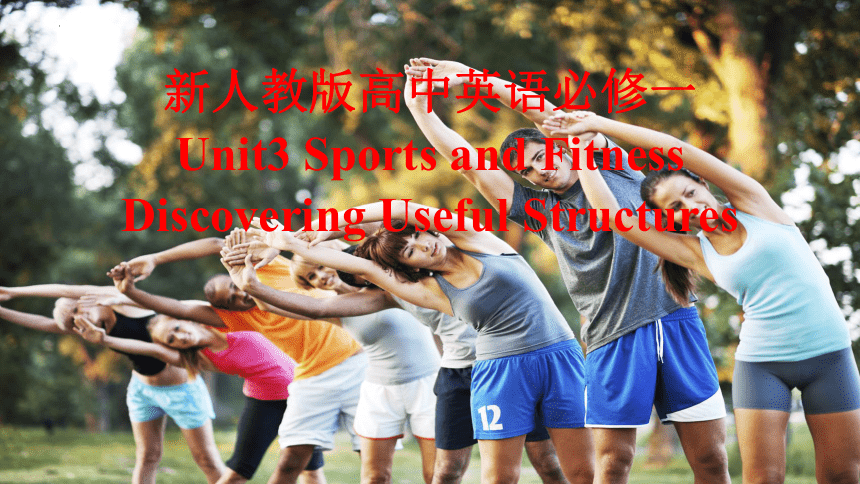 | |
| 格式 | pptx | ||
| 文件大小 | 5.9MB | ||
| 资源类型 | 教案 | ||
| 版本资源 | 人教版(2019) | ||
| 科目 | 英语 | ||
| 更新时间 | 2023-10-19 17:55:14 | ||
图片预览

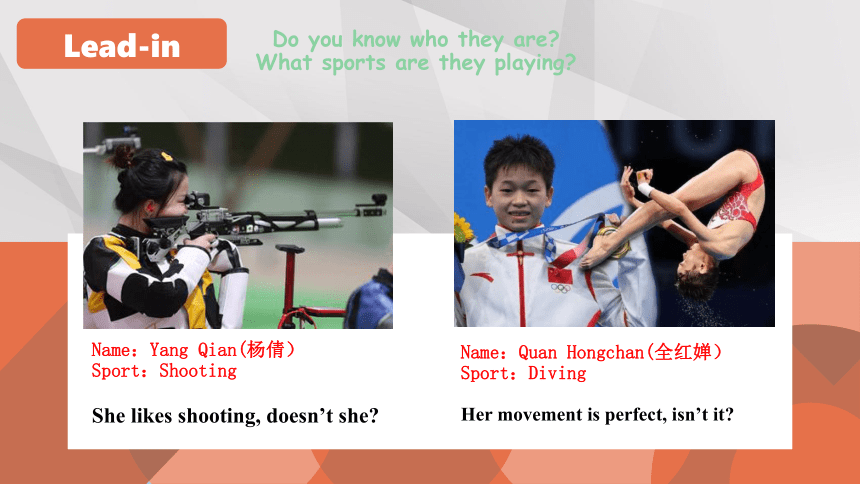
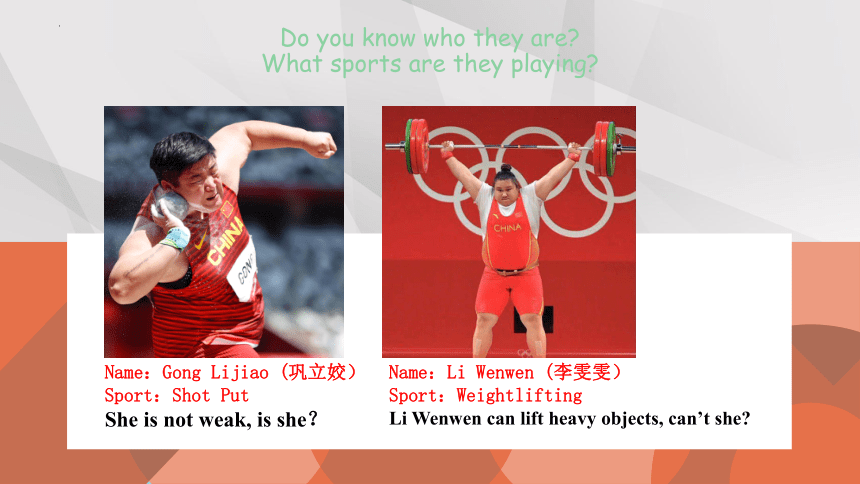
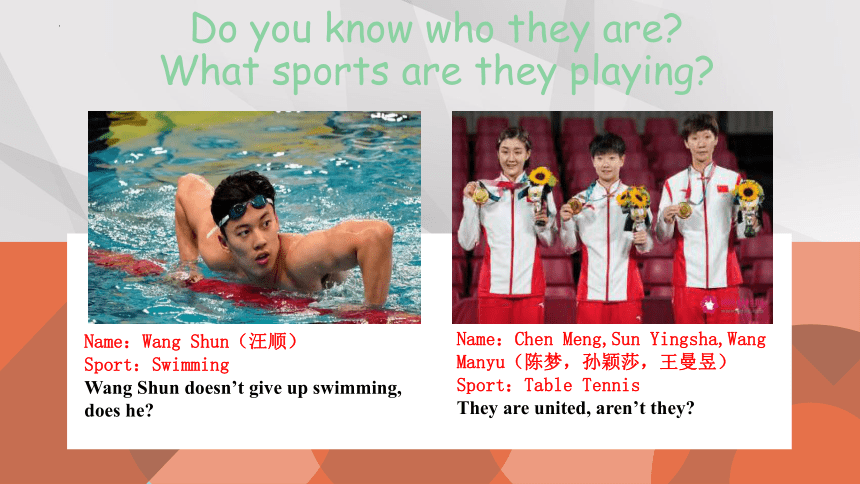
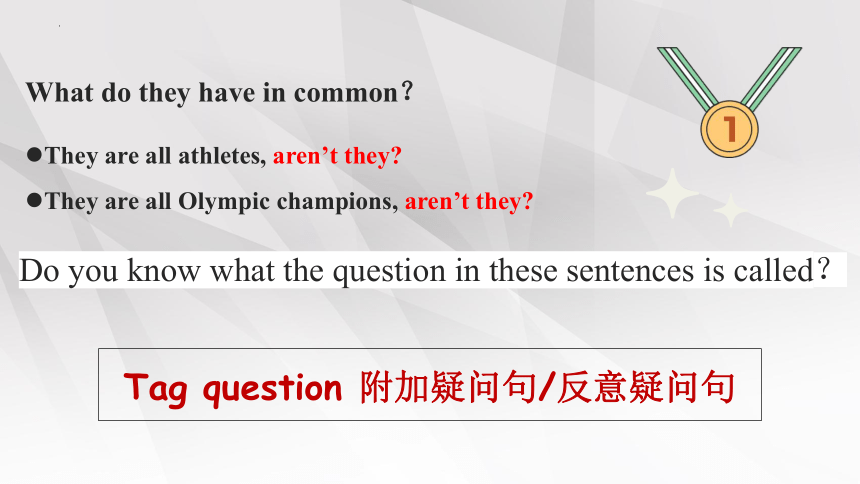
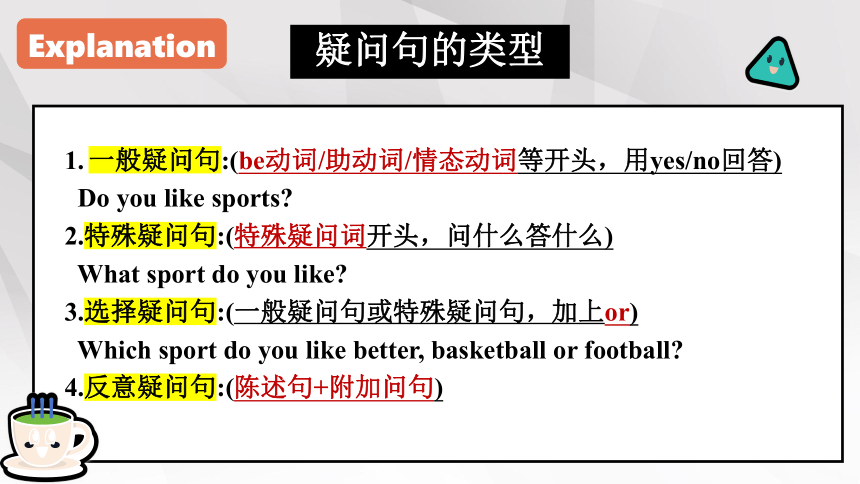
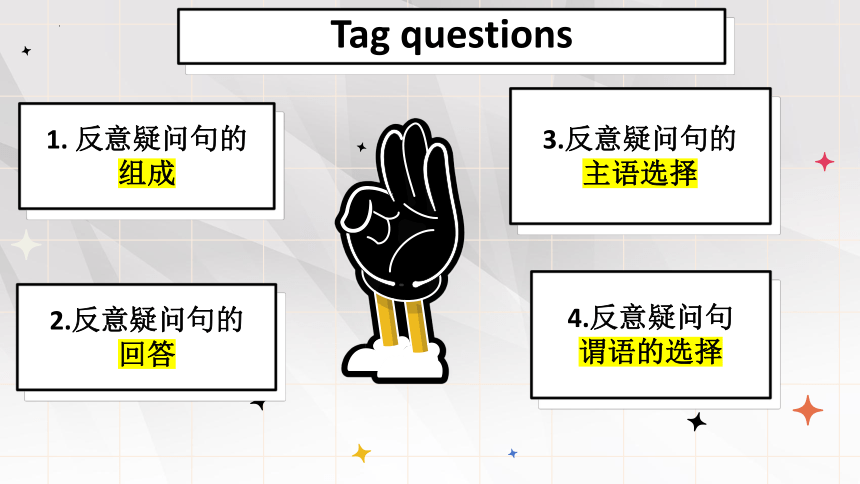
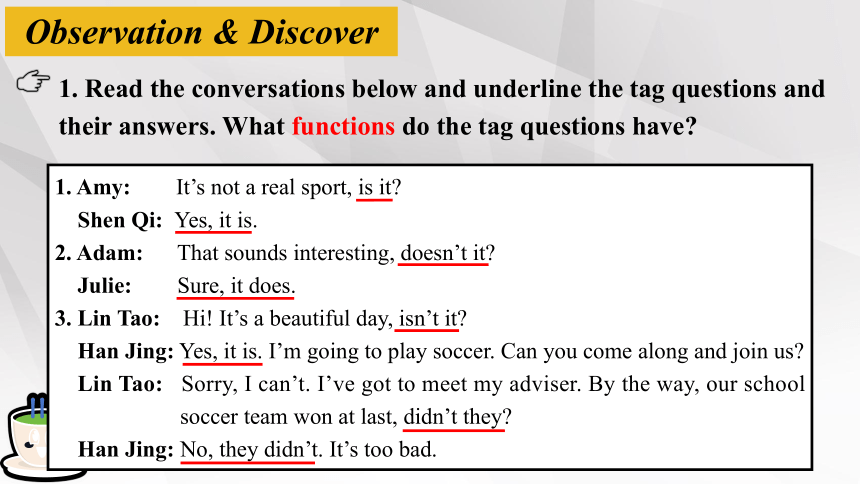
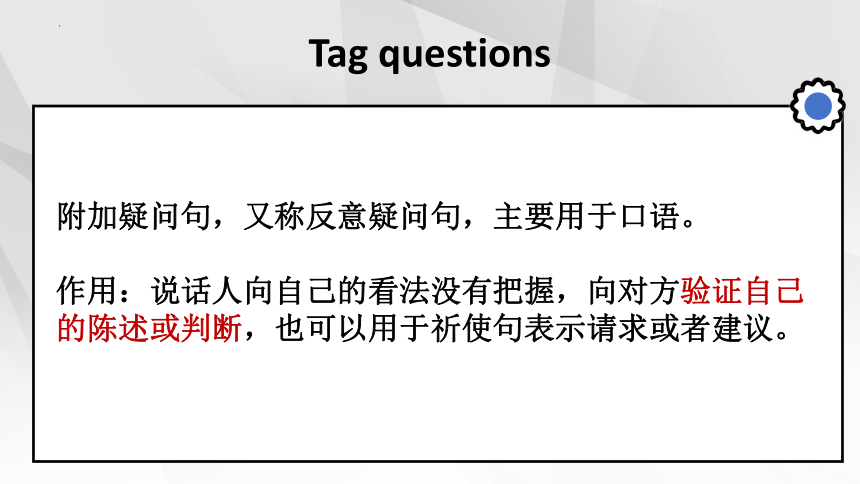
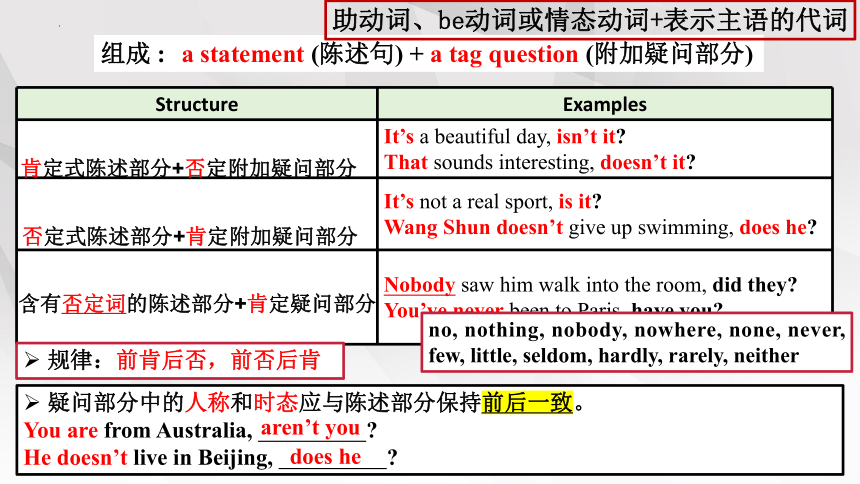
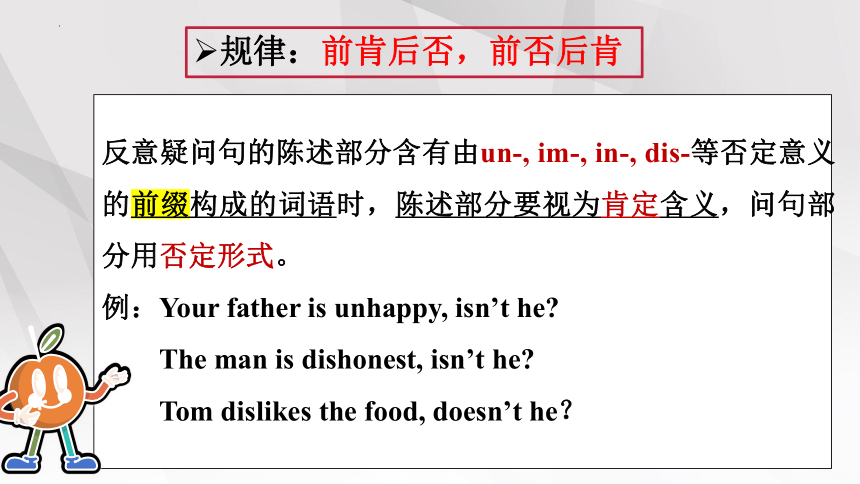
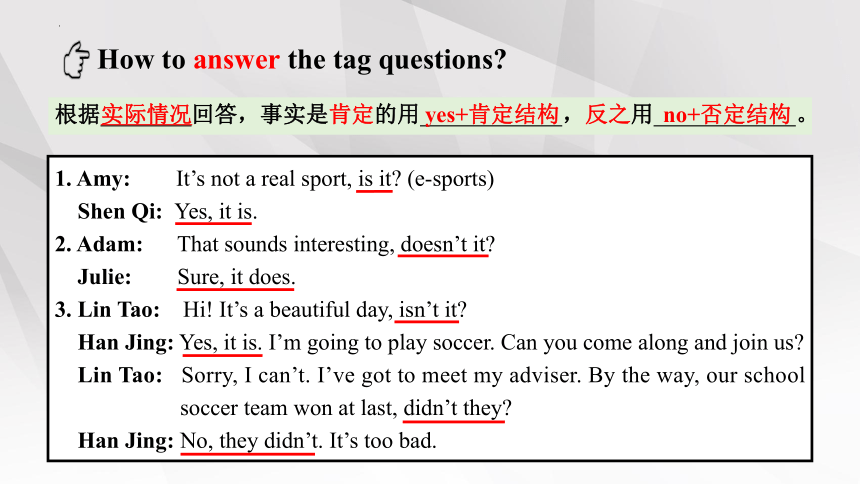
文档简介
(共37张PPT)
新人教版高中英语必修一Unit3 Sports and Fitness
Discovering Useful Structures
Name:Yang Qian(杨倩)
Sport:Shooting
She likes shooting, doesn’t she
Do you know who they are
What sports are they playing
Name:Quan Hongchan(全红婵)
Sport:Diving
Her movement is perfect, isn’t it
Lead-in
Name:Gong Lijiao (巩立姣)
Sport:Shot Put
She is not weak, is she?
Name:Li Wenwen (李雯雯)
Sport:Weightlifting
Li Wenwen can lift heavy objects, can’t she
Do you know who they are
What sports are they playing
Name:Wang Shun(汪顺)
Sport:Swimming
Wang Shun doesn’t give up swimming, does he
Name:Chen Meng,Sun Yingsha,Wang Manyu(陈梦,孙颖莎,王曼昱)
Sport:Table Tennis
They are united, aren’t they
Do you know who they are
What sports are they playing
What do they have in common?
They are all athletes, aren’t they
They are all Olympic champions, aren’t they
Do you know what the question in these sentences is called?
Tag question 附加疑问句/反意疑问句
疑问句的类型
一般疑问句:(be动词/助动词/情态动词等开头,用yes/no回答)
Do you like sports
2.特殊疑问句:(特殊疑问词开头,问什么答什么)
What sport do you like
3.选择疑问句:(一般疑问句或特殊疑问句,加上or)
Which sport do you like better, basketball or football
4.反意疑问句:(陈述句+附加问句)
Explanation
Tag questions
2.反意疑问句的回答
3.反意疑问句的主语选择
1. 反意疑问句的组成
4.反意疑问句谓语的选择
1. Read the conversations below and underline the tag questions and their answers. What functions do the tag questions have
1. Amy: It’s not a real sport, is it
Shen Qi: Yes, it is.
2. Adam: That sounds interesting, doesn’t it
Julie: Sure, it does.
3. Lin Tao: Hi! It’s a beautiful day, isn’t it
Han Jing: Yes, it is. I’m going to play soccer. Can you come along and join us
Lin Tao: Sorry, I can’t. I’ve got to meet my adviser. By the way, our school
soccer team won at last, didn’t they
Han Jing: No, they didn’t. It’s too bad.
Observation & Discover
Tag questions
附加疑问句,又称反意疑问句,主要用于口语。
作用:说话人向自己的看法没有把握,向对方验证自己的陈述或判断,也可以用于祈使句表示请求或者建议。
Structure Examples
It’s a beautiful day, isn’t it
That sounds interesting, doesn’t it
It’s not a real sport, is it
Wang Shun doesn’t give up swimming, does he
Nobody saw him walk into the room, did they
You’ve never been to Paris, have you
否定式陈述部分+肯定附加疑问部分
含有否定词的陈述部分+肯定疑问部分
肯定式陈述部分+否定附加疑问部分
规律:前肯后否,前否后肯
a statement (陈述句) + a tag question (附加疑问部分)
疑问部分中的人称和时态应与陈述部分保持前后一致。
You are from Australia,
He doesn’t live in Beijing,
does he
aren’t you
组成 :
no, nothing, nobody, nowhere, none, never, few, little, seldom, hardly, rarely, neither
助动词、be动词或情态动词+表示主语的代词
反意疑问句的陈述部分含有由un-, im-, in-, dis-等否定意义的前缀构成的词语时,陈述部分要视为肯定含义,问句部分用否定形式。
例:Your father is unhappy, isn’t he
The man is dishonest, isn’t he
Tom dislikes the food, doesn’t he?
规律:前肯后否,前否后肯
1. Amy: It’s not a real sport, is it (e-sports)
Shen Qi: Yes, it is.
2. Adam: That sounds interesting, doesn’t it
Julie: Sure, it does.
3. Lin Tao: Hi! It’s a beautiful day, isn’t it
Han Jing: Yes, it is. I’m going to play soccer. Can you come along and join us
Lin Tao: Sorry, I can’t. I’ve got to meet my adviser. By the way, our school
soccer team won at last, didn’t they
Han Jing: No, they didn’t. It’s too bad.
How to answer the tag questions
根据 回答,事实是肯定的用 ,反之用 。
yes+肯定结构
no+否定结构
实际情况
2. Adam: That sounds interesting, doesn’t it
Julie: Sure, it does.
3. Lin Tao: Hi! It’s a beautiful day, isn’t it
Han Jing: Yes, it is.
1. Amy: It’s not a real sport, is it (e-sports)
Shen Qi: Yes, it is.
根据 回答,事实是肯定的用 ,反之用 。
yes+肯定结构
no+否定结构
实际情况
Translate
它(电子竞技)不是一项真正的运动项目,对吗?
不,它是一项真正的运动项目。
那听起来很有趣,不是吗?
当然,这听起来很有趣。
嗨!这是美好的一天,不是吗?
是,这是美好的一天。
在前否后肯的结构中,yes 译成“不”,no 译成“是”。
1. They work hard, don’t they
— 是的,他们工作努力。
— 不,他们工作不努力。
2. They don’t work hard, do they
— 不,他们工作努力。
— 是的,他们工作不努力。
Try to answer the tag questions.
Yes, they do.
No, they don’t.
Yes, they do.
No, they don’t.
根据 回答,事实是肯定的用 ,反之用 。
yes+肯定结构
no+否定结构
实际情况
在前否后肯的结构中,yes译成“不”,no译成“是”。
3. Tom made no answer, did he
---- .
(是的,他没回答。)
4. The film wasn’t very good, was it
---- .
(是的,不怎么好看。)
No, he didn’t.
No, it wasn’t.
疑问部分主语的选择:
This is Tom’s textbook, isn’t it
These are your books, aren’t they
That isn’t your teacher, is he/she
Nothing in the world is difficult, is it
Everything is ready, isn’t it
2. 陈述句主语是指示代词this, that, these, those指物时, 附加疑问句主语要用 ;指人时,疑问句主语要用 。
it或they
相应的人称代词
Everyone knows that writer, don’t they / doesn’t he
No one is at school now, are they
3. 陈述句主语是表示人的不定代词,如anyone, someone, no one, everybody, nobody, somebody 等,附加疑问句的主语通常用 。
he或they
4. 陈述句主语是表示物的不定代词,如anything, nothing, something, everything等,反意疑问句的主语用 。
it
Your brother has gone to the library, hasn’t he
1. 陈述句主语是名词时, 附加疑问句的主语要用 来代替。
相应的人称代词
助动词、be动词或情态动词+表示主语的代词
Smoking is not allowed here, is it
What he lacks is courage, isn’t it
5. 陈述句主语是非谓语动词或主语从句时, 附加疑问句的主语要用 来代替。
it
I don’t think (that) he is bright, is he
He thinks (that) he is going to become a doctor, doesn’t he
There is little water left, is there
Let’s go to school, shall we
Let us/ me have a try, will you
6. 陈述句含宾语从句时,陈述部分主语是第一人称,附加疑问句的主语同________ 保持一致; 如不是第一人称,则疑问部分主语同___________保持一致。
7. Let’s后的附加疑问句用 。
Let us/me后的附加疑问句用 。
9. 陈述句如果是there be句型,反意疑问句的主语用 。
there
从句主语
shall we
will you
Come along with me, will you/won’t you
Don’t make any noise, will you
8. 陈述部分是祈使句,无论是否定还是肯定,附加疑问部分多用 。肯定的祈使句的附加疑问句也可用_________。
will you
won’t you
主句主语
特殊用法
陈述部分I am时,疑问部分要用 aren't I.
I'm as tall as your sister,aren't I
1. 陈述部分谓语为 have、has、had
(1) 表示 “拥有”, 反意疑问句的谓语用have或do的相应形式都可以。
不表示“拥有”, 用do 的相应形式。
例:They have a house in the town, haven’t they/don’t they
He has lunch at school, doesn’t he?
(2) 陈述句的谓语动词是情态动词 have/has to时, 疑问部分用do的相应形式。
例: They have to go there, don’t they?
He has to leave early, doesn’t he?
谓语的选择
谓语的选择
(3) 陈述部分的谓语是 had better 时, 疑问部分用hadn’t。
例:You’d better have a good rest, hadn’t you?
2. 陈述句中的谓语动词是 wish 时, 疑问部分常用may。
例:You wish to go home, may you﹖
3. 陈述部分用 used to+主语 时, 问句部分用didn’t+主语 ?或 usedn’t+主语 ?
例:He used to live in the country, didn’t he / usedn’t he
They used to be good friends, didn’t they / usedn’t they
4. 陈述部分情态动词 must
(1) 表 “必须” 时, 疑问部分用 mustn’t
例: You must work hard next term, mustn’t you
I must answer the letter, mustn’t I
(2) 表 “推测” 时, 疑问部分多与must之后的动词形式和时态与句子主语保持一致。
例:Her mother must be a teacher, isn’t she?
She must have read the novel, hasn’t she?
谓语的选择
Complete the conversations with appropriate tag questions or correct answers.
1. A: It’s not going to rain, is it
B: __________. It’s a good day for sports.
A: Then we can play football, ________
B: ___________. We don’t have a ball.
2. A: It’s Sports Day next Thursday, _______
B: You’re right, it is. Let’s ask Xia Lei if she wants to join a team.
A: She likes soccer, __________
B: ______________. But she loves volleyball. She could be in the volleyball team.
3. A: It’s time for badminton class. Where is the coach He’s late, _______
B: It’s been 10 minutes already. He isn’t coming, _____
A: Cool! We can have a good time. That’s great!
B: Shh!
A: Oh no, he’s right behind me, _______ C: Yes, I am!
No, it isn’t
can’t we
No, we can’t
isn’t it
doesn’t she
No, she doesn’t
isn’t he
is he
isn’t he
2
① Your parents had a long talk with you last night,
② No one phoned me while I was out,
③ Nothing has been considered about this meeting,
④ That was a hundred years ago,
⑤ Turn off the lights when you leave the classroom,
⑥ Few people are here,
⑦ There’s no room here,
⑧ Let’s go there by bus,
⑨ Let us go there by bus,
⑩ Don’t forget to give Polly some food,
You think (that) you are funny,
What he needs is the spirit of never giving up,
Application
don’t you
didn’t they
did they
has it
wasn’t it
will/won’t you
are they
is there
shall we
will you
will/won’t you
doesn’t it
Work in pairs. Use tag questions to role-play one of the situations below.
Event
Address
Date
3
Conversation 1
A: The Sports Day is coming soon, isn’t it
B: Yes, it is. They need some volunteers, don’t they
A: Yes, they do. We should volunteer, shouldn’t we
B: Yes, we should.
Conversation 2
A: Wow, Chen Liang can jump really high, can’t he
B: He sure can! We are going to win, aren’t we
A: I think so. The other team must score 10 points in two minutes. It can’t be done, can it
B: I don’t think so. I’ll be right back ... Oh no! The other team didn’t win, did they
A: I’m afraid so!
Sample
Complete the conversations with appropriate tag questions or correct answers. Then act them out.
1. A: It’s not going to rain, is it
B: __________. It’s a good day for sports.
A: Then we can play football, ________
B: ___________. We don’t have a ball.
No, it isn’t
can’t we
No, we can’t
Practice
2. A: It’s Sports Day next Thursday, _______
B: You’re right, it is. Let’s ask Xia Lei if she wants to join a team.
A: She likes soccer, __________
B: ______________. But she loves volleyball. She could be in the volleyball team.
isn’t it
doesn’t she
No, she doesn’t
3. A: It’s time for badminton class. Where is the coach He’s late, _______
B: It’s been 10 minutes already. He isn’t coming, _____
A: Cool! We can have a good time. That’s great!
B: Shh!
A: Oh no, he’s right behind me, ______
C: Yes, I am!
isn’t he
is he
isn’t he
I. 用反意疑问句补全句子。
1. No one wants to leave, ________
2. You must read more books next term, ___________
3. Let’s talk about your son now, ________
4. I don’t think you’ve heard of this concept before, ________
5. People should make the best of what they’ve learnt,
________________
6. There have been some terrible scenes on television,
______________
do they
mustn’t you
shall we
have you
shouldn’t they
haven’t there
II. 用恰当的反意疑问句补全下面对话。
Host: You’ve lived in Hollywood for many years, _____________
Guest: Since I was eighteen and came here to write my first screenplay.
Host: You didn’t know anyone here at first,_____________
Guest: No. And I didn’t have a cent to my name. Just some ideas and a lot
of hope. It sounds crazy, _____________
Host: But things have worked out for you, ____________ You’re working
on another screenplay now, ___________
haven’t you
did you
doesn’t it
haven’t they
aren’t you
Guest: Yes. It's a comedy about some kids who become invisible.
Host: Speaking of kids, you have some of your own,
_____________________
Guest: Two boys and a girl — all very visible!
Host: I know what you mean. Do you ever wish they were invisible
Guest: Now, that’s an interesting thought,
___________
don’t / haven’t you
isn’t it
Work in pairs: Use tag questions to role-play one of the situations below.
反意疑问句解题步骤
1. 判定:肯否定
2. 找动:确定谓语动词的类型
3. 换代:将主语转换为相应的代词
Summary
1. Let’s go and work out in the gym, ____________
2. You don’t take part in a marathon when you’re ill, ____________
3. Turn off the TV, ____________________
4. She’s doing all she can for us in times of stress, so we must back her up,
____________
5. Henry thinks you are cheating your friends, ____________
6. Andy’s never been anything but a friendly guy, ____________
7. Emily had to cut out sugar from her diet as her doctor suggested,
____________
8. There’s going to be a talk on wellness and fitness next week,
____________
shall we
do you
mustn’t we
will/won’t/can/can’t you
doesn’t he
1. Add tag questions to the statements. (P85-2)
has he
didn’t she
isn’t there
Work Book
2. Complete the conversation with appropriate tag questions. (P85-3)
Tom: Mum, I can have one more burger, ____________
Mum: No, you can’t. You’ve already had two! But you can have some yoghurt. Oh, what’s that noise
Dad: It isn’t a storm coming, ____________
Tom: Yes, it is. But it’s on TV! Dad, come and see, _______________
Dad: What movie are you watching
Tom: The Day after Tomorrow.
Mum: Let’s watch it together, ____________ Family Time!
Dad: Good idea!
can’t I
is it
will/won’t you
shall we
Work Book
3. Complete the questionnaire for Chris. Then fill in the blanks below and
write an ending to the conversation, using tag questions where necessary.
(P85-4)
A: Hi Chris! My name is Steve. I’m a trainer here at the gym. So you’ve just filled out our questionnaire, ____________
B: Yes. It’s nice to meet you, Steve.
A: It’s good to meet you, too! OK, let me take a look at your answers. Hmm ... So you’ve never worked out in a gym before, ____________
B: No, I haven’t, Steve. Embarrassing (让人尴尬的), but true.
A: Oh, don’t be embarrassed! It’s never too late to start. But I have to ask ... You think working out for ... hours a week is enough, ____________
...
haven’t you
have you
don’t you
3. Complete the questionnaire for Chris. Then fill in the blanks below and
write an ending to the conversation, using tag questions where necessary.
(P85-4)
A: Hi Chris! My name is Steve. I’m a trainer here at the gym. So you’ve just filled out our questionnaire, haven’t you
B: Yes. It’s nice to meet you, Steve.
A: It’s good to meet you, too! OK, let me take a look at your answers. Hmm ... So you’ve never worked out in a gym before, have you
B: No, I haven’t, Steve. Embarrassing (让人尴尬的), but true.
A: Oh, don’t be embarrassed! It’s never too late to start. But I have to ask ... You think working out for ... hours a week is enough, don’t you
B: You don’t think that’s enough, do you
A: Well, I guess the main point is what you want to achieve here. ... You want to be fitter and stronger, don’t you
B: Yes, I do.
A: Well, you should spend at least six hours at the gym each week. Let’s get started this Friday night, shall we
B: Yes, let’s do this!
Review grammar.
Make a conversation according to Activity 3 on page 40.
Homework
新人教版高中英语必修一Unit3 Sports and Fitness
Discovering Useful Structures
Name:Yang Qian(杨倩)
Sport:Shooting
She likes shooting, doesn’t she
Do you know who they are
What sports are they playing
Name:Quan Hongchan(全红婵)
Sport:Diving
Her movement is perfect, isn’t it
Lead-in
Name:Gong Lijiao (巩立姣)
Sport:Shot Put
She is not weak, is she?
Name:Li Wenwen (李雯雯)
Sport:Weightlifting
Li Wenwen can lift heavy objects, can’t she
Do you know who they are
What sports are they playing
Name:Wang Shun(汪顺)
Sport:Swimming
Wang Shun doesn’t give up swimming, does he
Name:Chen Meng,Sun Yingsha,Wang Manyu(陈梦,孙颖莎,王曼昱)
Sport:Table Tennis
They are united, aren’t they
Do you know who they are
What sports are they playing
What do they have in common?
They are all athletes, aren’t they
They are all Olympic champions, aren’t they
Do you know what the question in these sentences is called?
Tag question 附加疑问句/反意疑问句
疑问句的类型
一般疑问句:(be动词/助动词/情态动词等开头,用yes/no回答)
Do you like sports
2.特殊疑问句:(特殊疑问词开头,问什么答什么)
What sport do you like
3.选择疑问句:(一般疑问句或特殊疑问句,加上or)
Which sport do you like better, basketball or football
4.反意疑问句:(陈述句+附加问句)
Explanation
Tag questions
2.反意疑问句的回答
3.反意疑问句的主语选择
1. 反意疑问句的组成
4.反意疑问句谓语的选择
1. Read the conversations below and underline the tag questions and their answers. What functions do the tag questions have
1. Amy: It’s not a real sport, is it
Shen Qi: Yes, it is.
2. Adam: That sounds interesting, doesn’t it
Julie: Sure, it does.
3. Lin Tao: Hi! It’s a beautiful day, isn’t it
Han Jing: Yes, it is. I’m going to play soccer. Can you come along and join us
Lin Tao: Sorry, I can’t. I’ve got to meet my adviser. By the way, our school
soccer team won at last, didn’t they
Han Jing: No, they didn’t. It’s too bad.
Observation & Discover
Tag questions
附加疑问句,又称反意疑问句,主要用于口语。
作用:说话人向自己的看法没有把握,向对方验证自己的陈述或判断,也可以用于祈使句表示请求或者建议。
Structure Examples
It’s a beautiful day, isn’t it
That sounds interesting, doesn’t it
It’s not a real sport, is it
Wang Shun doesn’t give up swimming, does he
Nobody saw him walk into the room, did they
You’ve never been to Paris, have you
否定式陈述部分+肯定附加疑问部分
含有否定词的陈述部分+肯定疑问部分
肯定式陈述部分+否定附加疑问部分
规律:前肯后否,前否后肯
a statement (陈述句) + a tag question (附加疑问部分)
疑问部分中的人称和时态应与陈述部分保持前后一致。
You are from Australia,
He doesn’t live in Beijing,
does he
aren’t you
组成 :
no, nothing, nobody, nowhere, none, never, few, little, seldom, hardly, rarely, neither
助动词、be动词或情态动词+表示主语的代词
反意疑问句的陈述部分含有由un-, im-, in-, dis-等否定意义的前缀构成的词语时,陈述部分要视为肯定含义,问句部分用否定形式。
例:Your father is unhappy, isn’t he
The man is dishonest, isn’t he
Tom dislikes the food, doesn’t he?
规律:前肯后否,前否后肯
1. Amy: It’s not a real sport, is it (e-sports)
Shen Qi: Yes, it is.
2. Adam: That sounds interesting, doesn’t it
Julie: Sure, it does.
3. Lin Tao: Hi! It’s a beautiful day, isn’t it
Han Jing: Yes, it is. I’m going to play soccer. Can you come along and join us
Lin Tao: Sorry, I can’t. I’ve got to meet my adviser. By the way, our school
soccer team won at last, didn’t they
Han Jing: No, they didn’t. It’s too bad.
How to answer the tag questions
根据 回答,事实是肯定的用 ,反之用 。
yes+肯定结构
no+否定结构
实际情况
2. Adam: That sounds interesting, doesn’t it
Julie: Sure, it does.
3. Lin Tao: Hi! It’s a beautiful day, isn’t it
Han Jing: Yes, it is.
1. Amy: It’s not a real sport, is it (e-sports)
Shen Qi: Yes, it is.
根据 回答,事实是肯定的用 ,反之用 。
yes+肯定结构
no+否定结构
实际情况
Translate
它(电子竞技)不是一项真正的运动项目,对吗?
不,它是一项真正的运动项目。
那听起来很有趣,不是吗?
当然,这听起来很有趣。
嗨!这是美好的一天,不是吗?
是,这是美好的一天。
在前否后肯的结构中,yes 译成“不”,no 译成“是”。
1. They work hard, don’t they
— 是的,他们工作努力。
— 不,他们工作不努力。
2. They don’t work hard, do they
— 不,他们工作努力。
— 是的,他们工作不努力。
Try to answer the tag questions.
Yes, they do.
No, they don’t.
Yes, they do.
No, they don’t.
根据 回答,事实是肯定的用 ,反之用 。
yes+肯定结构
no+否定结构
实际情况
在前否后肯的结构中,yes译成“不”,no译成“是”。
3. Tom made no answer, did he
---- .
(是的,他没回答。)
4. The film wasn’t very good, was it
---- .
(是的,不怎么好看。)
No, he didn’t.
No, it wasn’t.
疑问部分主语的选择:
This is Tom’s textbook, isn’t it
These are your books, aren’t they
That isn’t your teacher, is he/she
Nothing in the world is difficult, is it
Everything is ready, isn’t it
2. 陈述句主语是指示代词this, that, these, those指物时, 附加疑问句主语要用 ;指人时,疑问句主语要用 。
it或they
相应的人称代词
Everyone knows that writer, don’t they / doesn’t he
No one is at school now, are they
3. 陈述句主语是表示人的不定代词,如anyone, someone, no one, everybody, nobody, somebody 等,附加疑问句的主语通常用 。
he或they
4. 陈述句主语是表示物的不定代词,如anything, nothing, something, everything等,反意疑问句的主语用 。
it
Your brother has gone to the library, hasn’t he
1. 陈述句主语是名词时, 附加疑问句的主语要用 来代替。
相应的人称代词
助动词、be动词或情态动词+表示主语的代词
Smoking is not allowed here, is it
What he lacks is courage, isn’t it
5. 陈述句主语是非谓语动词或主语从句时, 附加疑问句的主语要用 来代替。
it
I don’t think (that) he is bright, is he
He thinks (that) he is going to become a doctor, doesn’t he
There is little water left, is there
Let’s go to school, shall we
Let us/ me have a try, will you
6. 陈述句含宾语从句时,陈述部分主语是第一人称,附加疑问句的主语同________ 保持一致; 如不是第一人称,则疑问部分主语同___________保持一致。
7. Let’s后的附加疑问句用 。
Let us/me后的附加疑问句用 。
9. 陈述句如果是there be句型,反意疑问句的主语用 。
there
从句主语
shall we
will you
Come along with me, will you/won’t you
Don’t make any noise, will you
8. 陈述部分是祈使句,无论是否定还是肯定,附加疑问部分多用 。肯定的祈使句的附加疑问句也可用_________。
will you
won’t you
主句主语
特殊用法
陈述部分I am时,疑问部分要用 aren't I.
I'm as tall as your sister,aren't I
1. 陈述部分谓语为 have、has、had
(1) 表示 “拥有”, 反意疑问句的谓语用have或do的相应形式都可以。
不表示“拥有”, 用do 的相应形式。
例:They have a house in the town, haven’t they/don’t they
He has lunch at school, doesn’t he?
(2) 陈述句的谓语动词是情态动词 have/has to时, 疑问部分用do的相应形式。
例: They have to go there, don’t they?
He has to leave early, doesn’t he?
谓语的选择
谓语的选择
(3) 陈述部分的谓语是 had better 时, 疑问部分用hadn’t。
例:You’d better have a good rest, hadn’t you?
2. 陈述句中的谓语动词是 wish 时, 疑问部分常用may。
例:You wish to go home, may you﹖
3. 陈述部分用 used to+主语 时, 问句部分用didn’t+主语 ?或 usedn’t+主语 ?
例:He used to live in the country, didn’t he / usedn’t he
They used to be good friends, didn’t they / usedn’t they
4. 陈述部分情态动词 must
(1) 表 “必须” 时, 疑问部分用 mustn’t
例: You must work hard next term, mustn’t you
I must answer the letter, mustn’t I
(2) 表 “推测” 时, 疑问部分多与must之后的动词形式和时态与句子主语保持一致。
例:Her mother must be a teacher, isn’t she?
She must have read the novel, hasn’t she?
谓语的选择
Complete the conversations with appropriate tag questions or correct answers.
1. A: It’s not going to rain, is it
B: __________. It’s a good day for sports.
A: Then we can play football, ________
B: ___________. We don’t have a ball.
2. A: It’s Sports Day next Thursday, _______
B: You’re right, it is. Let’s ask Xia Lei if she wants to join a team.
A: She likes soccer, __________
B: ______________. But she loves volleyball. She could be in the volleyball team.
3. A: It’s time for badminton class. Where is the coach He’s late, _______
B: It’s been 10 minutes already. He isn’t coming, _____
A: Cool! We can have a good time. That’s great!
B: Shh!
A: Oh no, he’s right behind me, _______ C: Yes, I am!
No, it isn’t
can’t we
No, we can’t
isn’t it
doesn’t she
No, she doesn’t
isn’t he
is he
isn’t he
2
① Your parents had a long talk with you last night,
② No one phoned me while I was out,
③ Nothing has been considered about this meeting,
④ That was a hundred years ago,
⑤ Turn off the lights when you leave the classroom,
⑥ Few people are here,
⑦ There’s no room here,
⑧ Let’s go there by bus,
⑨ Let us go there by bus,
⑩ Don’t forget to give Polly some food,
You think (that) you are funny,
What he needs is the spirit of never giving up,
Application
don’t you
didn’t they
did they
has it
wasn’t it
will/won’t you
are they
is there
shall we
will you
will/won’t you
doesn’t it
Work in pairs. Use tag questions to role-play one of the situations below.
Event
Address
Date
3
Conversation 1
A: The Sports Day is coming soon, isn’t it
B: Yes, it is. They need some volunteers, don’t they
A: Yes, they do. We should volunteer, shouldn’t we
B: Yes, we should.
Conversation 2
A: Wow, Chen Liang can jump really high, can’t he
B: He sure can! We are going to win, aren’t we
A: I think so. The other team must score 10 points in two minutes. It can’t be done, can it
B: I don’t think so. I’ll be right back ... Oh no! The other team didn’t win, did they
A: I’m afraid so!
Sample
Complete the conversations with appropriate tag questions or correct answers. Then act them out.
1. A: It’s not going to rain, is it
B: __________. It’s a good day for sports.
A: Then we can play football, ________
B: ___________. We don’t have a ball.
No, it isn’t
can’t we
No, we can’t
Practice
2. A: It’s Sports Day next Thursday, _______
B: You’re right, it is. Let’s ask Xia Lei if she wants to join a team.
A: She likes soccer, __________
B: ______________. But she loves volleyball. She could be in the volleyball team.
isn’t it
doesn’t she
No, she doesn’t
3. A: It’s time for badminton class. Where is the coach He’s late, _______
B: It’s been 10 minutes already. He isn’t coming, _____
A: Cool! We can have a good time. That’s great!
B: Shh!
A: Oh no, he’s right behind me, ______
C: Yes, I am!
isn’t he
is he
isn’t he
I. 用反意疑问句补全句子。
1. No one wants to leave, ________
2. You must read more books next term, ___________
3. Let’s talk about your son now, ________
4. I don’t think you’ve heard of this concept before, ________
5. People should make the best of what they’ve learnt,
________________
6. There have been some terrible scenes on television,
______________
do they
mustn’t you
shall we
have you
shouldn’t they
haven’t there
II. 用恰当的反意疑问句补全下面对话。
Host: You’ve lived in Hollywood for many years, _____________
Guest: Since I was eighteen and came here to write my first screenplay.
Host: You didn’t know anyone here at first,_____________
Guest: No. And I didn’t have a cent to my name. Just some ideas and a lot
of hope. It sounds crazy, _____________
Host: But things have worked out for you, ____________ You’re working
on another screenplay now, ___________
haven’t you
did you
doesn’t it
haven’t they
aren’t you
Guest: Yes. It's a comedy about some kids who become invisible.
Host: Speaking of kids, you have some of your own,
_____________________
Guest: Two boys and a girl — all very visible!
Host: I know what you mean. Do you ever wish they were invisible
Guest: Now, that’s an interesting thought,
___________
don’t / haven’t you
isn’t it
Work in pairs: Use tag questions to role-play one of the situations below.
反意疑问句解题步骤
1. 判定:肯否定
2. 找动:确定谓语动词的类型
3. 换代:将主语转换为相应的代词
Summary
1. Let’s go and work out in the gym, ____________
2. You don’t take part in a marathon when you’re ill, ____________
3. Turn off the TV, ____________________
4. She’s doing all she can for us in times of stress, so we must back her up,
____________
5. Henry thinks you are cheating your friends, ____________
6. Andy’s never been anything but a friendly guy, ____________
7. Emily had to cut out sugar from her diet as her doctor suggested,
____________
8. There’s going to be a talk on wellness and fitness next week,
____________
shall we
do you
mustn’t we
will/won’t/can/can’t you
doesn’t he
1. Add tag questions to the statements. (P85-2)
has he
didn’t she
isn’t there
Work Book
2. Complete the conversation with appropriate tag questions. (P85-3)
Tom: Mum, I can have one more burger, ____________
Mum: No, you can’t. You’ve already had two! But you can have some yoghurt. Oh, what’s that noise
Dad: It isn’t a storm coming, ____________
Tom: Yes, it is. But it’s on TV! Dad, come and see, _______________
Dad: What movie are you watching
Tom: The Day after Tomorrow.
Mum: Let’s watch it together, ____________ Family Time!
Dad: Good idea!
can’t I
is it
will/won’t you
shall we
Work Book
3. Complete the questionnaire for Chris. Then fill in the blanks below and
write an ending to the conversation, using tag questions where necessary.
(P85-4)
A: Hi Chris! My name is Steve. I’m a trainer here at the gym. So you’ve just filled out our questionnaire, ____________
B: Yes. It’s nice to meet you, Steve.
A: It’s good to meet you, too! OK, let me take a look at your answers. Hmm ... So you’ve never worked out in a gym before, ____________
B: No, I haven’t, Steve. Embarrassing (让人尴尬的), but true.
A: Oh, don’t be embarrassed! It’s never too late to start. But I have to ask ... You think working out for ... hours a week is enough, ____________
...
haven’t you
have you
don’t you
3. Complete the questionnaire for Chris. Then fill in the blanks below and
write an ending to the conversation, using tag questions where necessary.
(P85-4)
A: Hi Chris! My name is Steve. I’m a trainer here at the gym. So you’ve just filled out our questionnaire, haven’t you
B: Yes. It’s nice to meet you, Steve.
A: It’s good to meet you, too! OK, let me take a look at your answers. Hmm ... So you’ve never worked out in a gym before, have you
B: No, I haven’t, Steve. Embarrassing (让人尴尬的), but true.
A: Oh, don’t be embarrassed! It’s never too late to start. But I have to ask ... You think working out for ... hours a week is enough, don’t you
B: You don’t think that’s enough, do you
A: Well, I guess the main point is what you want to achieve here. ... You want to be fitter and stronger, don’t you
B: Yes, I do.
A: Well, you should spend at least six hours at the gym each week. Let’s get started this Friday night, shall we
B: Yes, let’s do this!
Review grammar.
Make a conversation according to Activity 3 on page 40.
Homework
